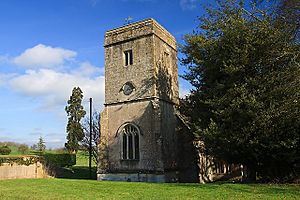St James's Church, Draycot Cerne facts for kids
Quick facts for kids St James's Church |
|
|---|---|
 |
|
| Location | Draycot Cerne, Sutton Benger, Wiltshire, England |
| Built | c. 1300 |
|
Listed Building – Grade II*
|
|
| Official name: Church of St James | |
| Designated | 20 December 1960 |
| Reference no. | 1200500 |
| Lua error in Module:Location_map at line 420: attempt to index field 'wikibase' (a nil value). | |
St James's Church is a very old church located in Draycot Cerne, a small place near Sutton Benger in Wiltshire, England. It was built a long, long time ago, between the years 1260 and 1280. That means it's over 700 years old!
This church is considered a very important historical building. It's listed as a Grade II* building on the National Heritage List for England. This special listing means it's a building of more than local importance. It has special historical or architectural interest.
Today, St James's Church is no longer used for regular church services. It's now a "redundant church," which means it's not active anymore. However, it's looked after by a group called the Churches Conservation Trust. This trust helps to protect and preserve old churches like St James's so people can still visit and learn about them. The church officially became part of the Trust's care on May 17, 1995.
The church sits in a beautiful park area. It's close to where a large old house called Draycot House used to be. That house was taken down around 1955.
A Church with Many Names
Did you know that St James's Church hasn't always been called St James's? Its name has changed several times over the centuries!
- In the late 1100s, it was known as All Saints' Church.
- By the 1700s, people called it St. Peter's.
- Finally, since the late 1800s, it has been known as St James's Church.
It's interesting how the church's identity has shifted through history!
Inside the Ancient Walls
The church has some very old parts. The main body of the church, called the nave, was built in the 1200s. The chancel, which is the part of the church where the altar is, was built in an "Early English" style. This means it has features common in English architecture from the 12th and 13th centuries. The chancel floor is actually a bit lower than the nave floor.
The tall, two-part tower at the west end of the church was added later, sometime in the 1500s or 1600s. It has strong supports called buttresses that help hold it up. The church was also changed and repaired quite a bit in the 1800s. This was a time when many old churches were "restored" to look their best.
Inside the church, you can find some amazing historical features:
- Wall Paintings: In the 1400s and 1500s, there were colorful paintings on the walls of the chancel.
- Pulpit and Pews: There's an old "Gothic" style pulpit, which is where the preacher would stand. You can also see "box pews," which are like enclosed seating areas.
- Stained Glass: Some of the windows have beautiful stained glass from the Victorian era. These were made by a company called Ward and Hughes.
Tombs and Memorials
St James's Church is also home to many old tombs and memorials. These are like special artworks that remember important people from the past.
- De Cerne Family: Some of the oldest tombs belong to the de Cerne family, who lived in the 1100s and 1200s. There's even a special brass plate on the tombstone of Sir Edward de Cerne.
- Knights and Nobles: You can see a stone statue of a knight from the 1200s. It's thought to be either Phillip or John de Cerne.
- Long Family: Many tombs and memorials are dedicated to members of the Long family, who were very important in the area. One special tomb is for Sir Thomas Long of Draycot.
- Sir Robert Long: There's a memorial bust (a statue of just the head and shoulders) of Sir Robert Long. This bust was made by a famous artist named Joseph Wilton, and it sits on a marble stand designed by James Wyatt.
These memorials help us remember the people who lived in this area centuries ago and learn about their lives.

